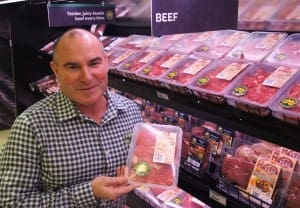REACTION from retail supermarket groups approached by Beef Central this week following the shock news that research has suggested that MAP packaging has a significant negative impact in meat tenderness has ranged from disquiet to disbelief.
The results (see this morning’s main story) have completely blind-sided major red meat supply chain stakeholders, it seems. One spokesman for a national supermarket retail chain said his team had ‘nearly fell off their chairs’ when first briefed on the findings.
Some retailers have already questioned whether the results from this initial trial truly reflect the impact that MAP retail packaging has on tenderness on all cattle.
Australia’s two largest retailers, Coles and Woolworths, both say they have not detected any significant rise in customer complaints over tenderness in MAP-packed retail-ready meat, which is widely used across the supermarket sector.

Coles’ Chris Nicklin
Coles head of meat operations Chris Nicklin said his company had commissioned MLA to conduct further studies to provide greater context to the issue.
“We’d like to see the research repeated, across a wider range of product types and MAP storage times, before making any decisions,” he said. “We need quantifiable data.”
“The entire Australian retail industry cannot simply abandon MAP packaging – there are billions of dollars tied up with the use of this technology in Australian meat supply chains. There are other extended shelf-life packaging options, of course, but they cannot be simply turned-on overnight,” Mr Nicklin said.
“But we maintain that there would still be four times as much variation in the eating quality performance of a piece of beef caused by the way a consumer cooks it, than from any possible impact caused by MAP-packaging.”
Mr Nicklin confirmed that a lot of Coles ‘premium’ beef offer now went into Darfresh or skin-packaging, rather than MAP.

Woolworths’ Pat McEntee
Director of the Woolworths Meat Company (effectively head of meat sales in Australian supermarkets) Pat McEntee, said he had asked some basic questions about the research outcomes which the people involved at this point ‘just couldn’t answer.’
“Before the industry reacts too quickly to this, it’s worth noting that this was a limited trial, on a narrow band of cattle out of one part of Australia. We’re not convinced yet it is a true representation of all types of cattle and circumstances. There’s still a lot of unknowns,” Mr McEntee said.
“But it does represent a major quandary for MSA in Australia,” he said.
Within Woolworths’ own retail operations, customer satisfaction in meat since the company had moved to retail-ready MAP-packaging had only improved.
“We get very few customer complaints on tenderness, and we measure and manage meat quality on a weekly basis,” Mr McEntee said.
“Our Voice of the Customer scores are in fact increasing – they’re getting better – so we are a little confounded by these findings.”
“Woolworths only sources young cattle with low ossification scores within the MSA grading system – our cattle are significantly different from those put through this MSA trial. So we need to know more,” he said.
Discovery raises a host of questions
The research findings raises a host of issues surrounding the use of MAP packaging and its impact on tenderness. Just some of these include:
- Did MAP packaging equipment manufacturers have any prior knowledge of the negative effects that the system has on red meat performance when marketing the equipment to red meat supply chains?
- Why has it taken so long to discover the negative effects of MAP on red meat performance, especially as the industry’s much-prized Meat Standards Australia tenderness guarantee scheme makes strong claims to be a ‘through-chain’ system, where all possible impacts on product tenderness are explored?
- What does it mean for the future of MAP-packaged product in Australian and international retail shelves, and the equipment that delivers it?
A lack of industry expenditure on further MSA pathways research work over the past ten years has been blamed by some stakeholders as the key reason why the tenderness problem was not picked up earlier.
With a couple of exceptions like long-distance transport effects, recent MSA pathways work has been driven mostly by commercial players, such as HGP manufacturer Elanco funding research into clearer distinctions on MSA tenderness impact from different types of growth promotants (see earlier report).
Beef Central understands that despite the enormous investment cost involved in large MAP packaging lines in Australia, they are relatively easy to convert into other packaging solutions suitable for red meat, should it be deemed necessary.



HAVE YOUR SAY